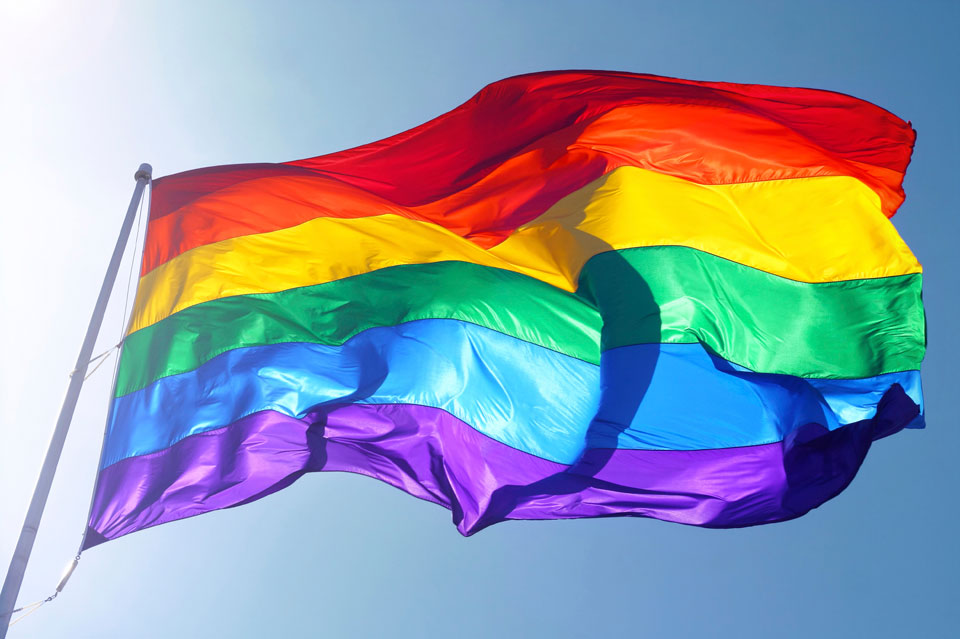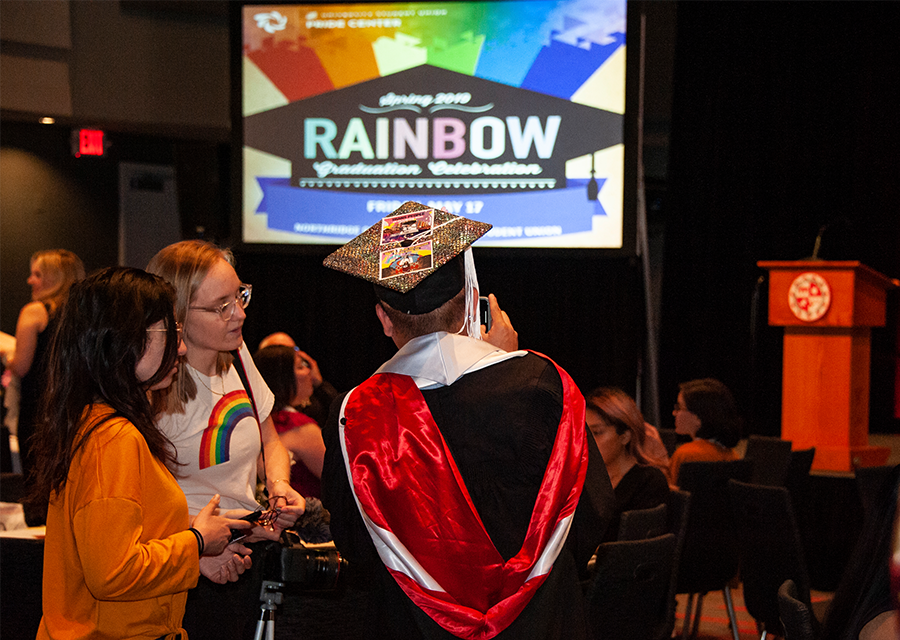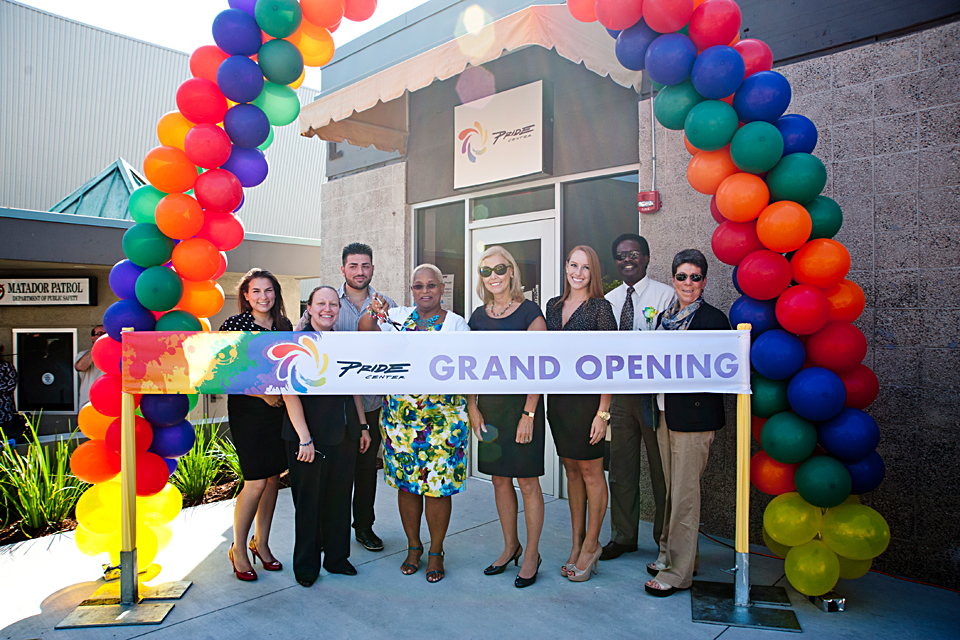Follow the Rainbow: CSUN Shows Pride Year-Round
Martin Pousson begins every semester by coming out to his students.
He does this, Pousson said, because there are still high rates of violence against LGBTQIA+ (lesbian, gay, bisexual, transgender, queer/questioning, intersex, asexual and other terms) individuals in many parts of the world. He knows that for some students — whether they come from another country, out of state or even from a less-than-accepting family — CSUN might be the first place they have found acceptance.
“They can come out in the Queer Studies Program,” said Pousson, a professor in the College of Humanities, where he teaches creative writing and Queer studies courses. “They can come out in the Pride Center. They can come out in some of their classes.”
Thanks to the efforts of student activists and faculty, CSUN boasts a fully staffed Pride Center, a Queer Studies Program (which offers an interdisciplinary minor) and a rich history of LGBTQIA+ involvement.
This month, the Delmar T. Oviatt Library also unveiled a Pride Month display, which features bestsellers, fiction, memoirs and children’s literature that celebrates the creativity and community of those who identify as LGBTQIA+.
“The display helps to demonstrate to others who might not be aware of the numerous contributions the LGBTQIA+ community has made to society,” said Coleen Martin, coordinator of outreach services for the Oviatt Library. “[These] books touch upon the experiences of the community, as well as their legacy.”
Many CSUN students are very aware of what it means to show pride. Xarlie Facio, a student assistant at CSUN’s Pride Center, noted that trans women are still murdered at high rates and LGBTQIA+ immigrants have reported being abused in Immigration and Customs Enforcement detention centers.
“By being visibly prideful, we get to shape the narrative of pride on CSUN for the better of the LGBTQIA+ community,” Facio said. “I also feel that it is our duty, and my duty, to carry on the legacies that black and brown trans women paved for my siblings and myself. With that said, I challenge myself to be an unapologetic fat femme that happens to be queer, trans and of color. Yes, we have pride now, but that’s not enough.”
CSUN became the accepting place it is today thanks to individuals and groups who were willing to step up and fight for it, Pousson said.
The Queer Studies Program was established in 2008 to go beyond LGBTQIA+ history to educate students about identity formation and political expression, Pousson said. Students learn what it means to be committed to principles of freedom, equality, justice and participatory democracy in ways that fully value LGBTQIA+ people and communities. The program explores how heterosexism, heteronormativity and transphobia intersect and collide with national, ethnic, racial, class and other identifications.
“Students were vital to the success of the program by taking the classes,” said Pousson, who joined the faculty in 2007.
In 2008-09, CSUN held a series of vigils to remember victims of LGBTQIA+ violence, where students were encouraged to speak. At one, Pousson said, Martel Okonji, a gay student who went on to help lead the charge for a campus Pride Center, stunned the audience by noting that LBGTQIA+ students did not yet have a safe space at CSUN. It was a turning point, the professor said.
Pousson’s office was used as a pseudo-Pride Center for students, a safe place for students to set up petitions and escape anti-LGBTQIA+ attitudes they experienced, on and off campus. To keep that space open for students who needed it, he said, Tanni Block, a nonbinary student who used she/her pronouns, left her class regularly to run across campus to obtain the keys to Pousson’s office when he was teaching. Block passed away in May 2012, and the Pride Center and Queer Studies Program established the Tanni Block Memorial LGBTQ Scholarship in her honor.
In 2012, CSUN became the first U.S. campus outside the UC system to host a Queer and Trans People of Color (QTPOC) Conference, where LGBTQIA+ people of color could come together to build community and attend workshops focused on QTPOC identities and experiences., Pousson noted.
Student activists began petitioning for a Pride Center on campus in 2010. When Sarina Loeb ’13 (M.S., College Counseling Student Services) was a graduate student at CSUN, one of her dreams was to run a LBGTQIA+ resource center. She fulfilled that dream in 2012, becoming the first coordinator of CSUN’s Pride Center when it opened that year in the University Student Union (USU).
Loeb, along with Pride Center student staff, began keeping track of the number of students who came to the Pride Center and the resources they used. This data was presented to the USU Board of Directors to advocate for more funding and a larger space. In 2015, the Pride Center moved to the second floor of the USU Sol Center, with three times the original space. Last year, former L.A. City Council member Mitchell Englander recognized Loeb for her efforts, as the LGBT Heritage Month honoree for L.A.’s 12th District.
In 2017, Pousson served on a panel featuring LBGTQIA+ authors, where he discussed his award-winning book “Black Sheep Boy.” The novel explores the coming-out journeys of people of various orientations, such as bisexual and transgender, told through the eyes of a young gay man from Louisiana. When asked if there was still a need for coming-out stories, another author on the panel said ‘No,’ that they were a thing of the past generation, Pousson recalled. He disagreed, saying, “It’s not generational, it’s geographical.”
Pousson said he still feels this is the case. “When I come out to my students, it’s not passé to them.”
The CSUN Pride Center is open year-round. Throughout the spring and fall semesters, it hosts weekly events for LGBTQIA+ students and allies. In past Pride Months (June), the center staff has hosted tables at Pride events off campus, and students and faculty have participated in the Los Angeles Pride Parade. Throughout the summer, the Pride Center remains open for students Monday through Thursday 10 a.m. to 5 p.m., and Friday 10 a.m. to 3 p.m. For more information, visit https://www.csun.edu/pride.
CSUN Today writer Liezl Bitas contributed to this report.




 experience
experience